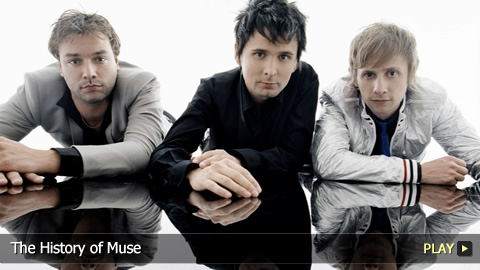The History of Muse

- Love is their resistance. Welcome to WatchMojo.com, and today we're taking a look at the history of Muse.
- Formation
- First EPs
- Debut
- Sophomore Effort
- Vocal Experimentation
- Live Shows and "Absolution"
- American Top Ten with "Black Holes and Revelations"
- Touring
- Top Five with "The Resistance"
- "Twilight" and Kate Hudson
- Dubstep, London 2012 Olympics and "The 2nd Law"
- One-of-a-Kind
Formation
Rock band Muse formed in 1994 in Teignmouth, Devon, England. Though vocalist, guitarist and pianist Matthew Bellamy, bassist Christopher Wolstenholme and drummer Dominic Howard had been in many bands since their teenage years, they only began considering music their profession in the mid-'90s.
First EPs
While building their name on the local scene, they met the Dangerous Records founder. Muse released two EPs with that label during the late ‘90s while they developed their evocative and powerful sound on stage and in studio.
Debut
Finally, in 1999 they released their first album, Showbiz, via Taste Media in the UK and Maverick Records in the U.S. With heavy metal and progressive rock elements, the alternative rock disc was a respectable first outing for the band, at least at home. Muse then continued expanding and experimenting with their music, despite being brushed off by several critics for their sonic similarities to Radiohead.
Sophomore Effort
That experimentation was evident on 2001’s Origin of Symmetry. By using various instruments, the band showed off a fusion of alternative music with progressive and space rock on their sophomore effort. The album also featured riff-heavy tracks and lyrics that focused on worldly issues like technological advancements.
Vocal Experimentation
While critics and fans responded favorably to Bellamy’s high-pitched singing, the same could not be said for Maverick Records. It therefore took four years for Origin of Symmetry to make it to American audiences through Warner Bros. Regardless, the disc has since been deemed one of Muse's finest achievements.
Live Shows and “Absolution”
After taking their powerful and moving tunes on the road, they released the live “Hullabaloo” DVD and accompanying double-disc set. Their next studio effort was 2003’s Absolution, which bested the top three performance of their last album by topping the UK charts during its first week. The alternative and progressive rock disc continued the heavy feel of past material, but added string arrangements to the mix. Several singles were issued, including one that charted within the top 10 of the UK charts and the American Billboard Modern Rock Tracks chart.
American Top Ten with “Black Holes and Revelations”
Following a world tour and a Glastonbury gig that thoroughly established Muse’s reputation as a rocking live band, they dropped Black Holes and Revelations in 2006. The critically well-received record topped the UK chart once again and found a spot within the U.S. Billboard 200’s top ten. The songs showcased a vibrant combination of electronica, space, alternative and progressive rock, with lyrics inspired by politics and sci-fi. Several became top twenty singles in the UK and even found top 10 success in the U.S. via the Modern Rock Tracks chart.
Touring
Their fourth studio effort was supported with award-winning live shows that included their 2007 Wembley Stadium performances, which were documented in a CD/DVD set.
Top Five with “The Resistance”
Muse was soon back in the studio to record and produce their next album, 2009’s The Resistance. With help from dozens of musicians, the group incorporated classical music with symphonic and progressive rock to produce a collection of material that topped close to twenty charts around the world. It premiered at the third position of the U.S. Billboard 200 and attained much critical success, including a Grammy for Best Rock Album. The Resistance also spawned their most successful American single to that point: “Uprising” charted within the Billboard Hot 100’s top forty.
“Twilight” and Kate Hudson
Muse then targeted Twi-hards by contributing to the “The Twilight Saga: Eclipse” soundtrack during their subsequent world tour. Also around this time, frontman Matt Bellamy began a high-profile relationship with actress Kate Hudson.
Dubstep, London 2012 Olympics and “The 2nd Law”
By 2011, Muse was working on their next effort, The 2nd Law. A trailer for the record introduced fans to their use of dubstep sounds and electronic influences prior to its 2012 release. They also released the alt rock-based “Survival,” which became the London 2012 Olympics’ official song.
One-of-a-Kind
Known for blending genres like glam, space, progressive, symphonic and alternative rock with electronic and classical music, Muse is a one-of-a-kind band that is hard to define. With their worldwide success and legendary live performances, there is no argument that they will be victorious.
